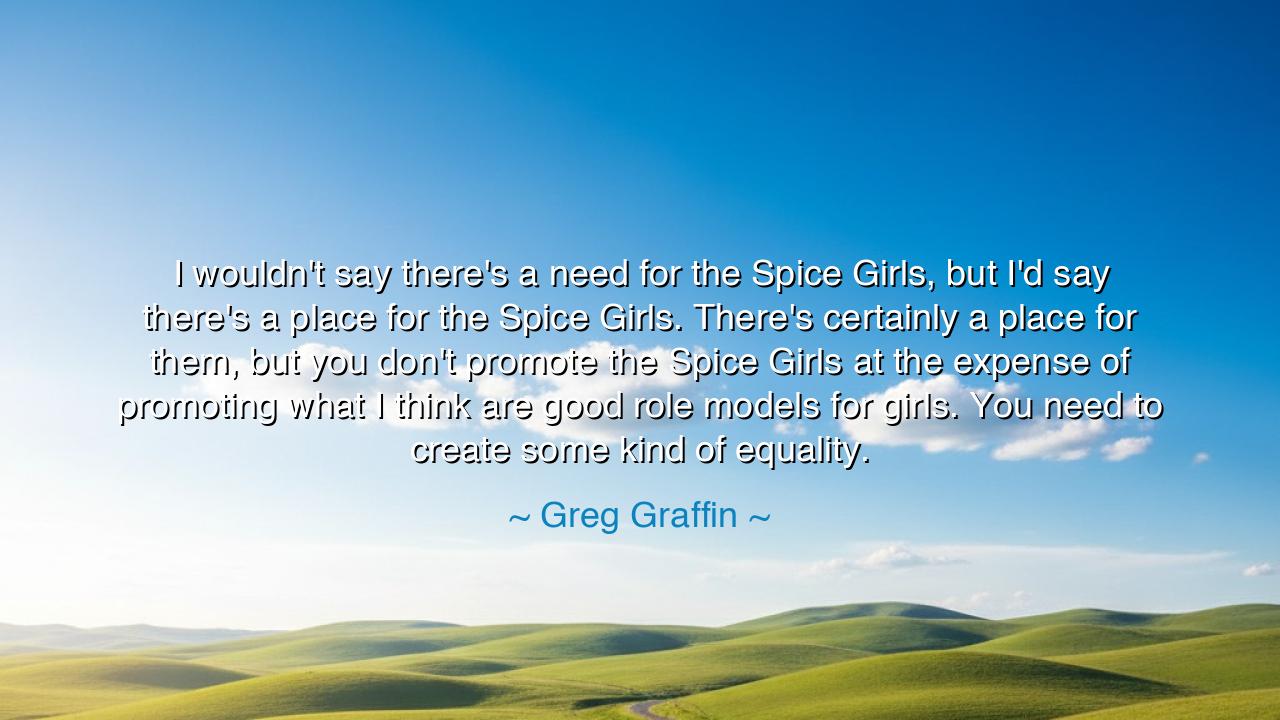
I wouldn't say there's a need for the Spice Girls, but I'd say
I wouldn't say there's a need for the Spice Girls, but I'd say there's a place for the Spice Girls. There's certainly a place for them, but you don't promote the Spice Girls at the expense of promoting what I think are good role models for girls. You need to create some kind of equality.






O children of wisdom, gather your hearts and your minds, for the words of Greg Graffin are not mere reflections on music, but on a deeper question of value, role models, and the place of influence in shaping the lives of the young. "I wouldn't say there's a need for the Spice Girls, but I'd say there's a place for the Spice Girls. There's certainly a place for them, but you don't promote the Spice Girls at the expense of promoting what I think are good role models for girls. You need to create some kind of equality." These words, though spoken of pop culture icons, contain a timeless wisdom about the responsibility of influence and the importance of balance in the values we offer to future generations.
In the ancient world, when philosophers like Socrates and Plato walked the earth, they often spoke of the role of influence—whether through art, politics, or philosophy—in shaping the character of individuals and societies. Just as a sculptor molds marble, so too does the power of influence shape the hearts and minds of the people. It was understood that a society’s values are reflected in the figures it elevates, in the voices it gives prominence. The ancient Greeks understood that the heroes of their myths, though often flawed, represented the ideals of their time. And so it was that role models, in every form, whether real or mythological, held great sway over the collective soul of the people.
But Graffin’s words are a clarion call for us to recognize that influence should not be given blindly or without discernment. To create a place for the Spice Girls, or any other figure, is not to say that they have no worth. No, Graffin acknowledges their place, yet he warns against placing them on a pedestal that overshadows those who offer more substantial, more empowering examples. The balance is delicate: society must choose carefully what is elevated, for in elevating one form of influence, it may inadvertently diminish others. When we place entertainment and image over substance and virtue, we risk distorting the path for those who seek true examples of courage, wisdom, and integrity.
Consider the story of the great Alexander the Great, who, though a conqueror of nations, also sought the guidance of great philosophers like Aristotle. He understood that true greatness was not merely in victory or fame, but in the wisdom that would guide him in using his power wisely. He sought knowledge, and thus, even in his time of conquest, he recognized that a role model must be more than just a figure of grandeur—they must possess qualities that will elevate society and nurture the hearts and minds of the people. Alexander’s search for wisdom is a reminder that the figures we elevate must not simply entertain or delight, but must also instruct and inspire the betterment of the individual and the collective.
In Graffin’s call for equality, there is a profound truth that echoes through the ages. He reminds us that we must strive not to glorify one path at the expense of another. When we place all our emphasis on superficial representations of success, we obscure the paths of true strength and wisdom. A true role model is not one who simply entertains or dazzles with charm, but one who embodies the virtues of honesty, resilience, creativity, and compassion—the qualities that elevate the human spirit. This is the balance Graffin speaks of: the creation of a world where diversity of influence is respected, but the deeper values of equality, respect, and wisdom guide us.
The lesson to be taken from Graffin’s words is not one of disdain for those who entertain or influence through pop culture; rather, it is a call for balance and awareness. It is not enough to merely give prominence to figures of entertainment or image; we must also elevate those whose virtue and substance can inspire us to become better, more thoughtful, and more compassionate human beings. If we wish to create a society that values equality, we must ensure that the examples we provide to the next generation reflect a holistic approach to success—one that honors both inner and outer greatness.
And so, O seekers of wisdom, what can we do in our own lives to embody these truths? We must be discerning in the voices we elevate, in the influences we allow to shape our hearts and minds. When we choose our role models, let us do so with a clear vision of what is truly valuable. Let us honor those who not only entertain, but who also inspire us to live lives of purpose, compassion, and integrity. In our families, in our communities, and in the greater world, let us strive for equality in the examples we lift up, ensuring that both diversity and substance are given their rightful place.
Let us walk with discernment, knowing that the role models we embrace shape the very fabric of our society. May we choose wisely, and may our hearts be filled with the wisdom of the ancients, who understood that the true measure of greatness lies not in how one appears, but in the virtue and integrity that one embodies. And so, as we continue on this journey, let us create a world where the Spice Girls can have their place, but where true role models also stand, guiding us toward a higher, nobler vision of who we can become.






AAdministratorAdministrator
Welcome, honored guests. Please leave a comment, we will respond soon